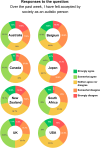Cross-cultural variation in experiences of acceptance, camouflaging and mental health difficulties in autism: A registered report
- PMID: 38507392
- PMCID: PMC10954134
- DOI: 10.1371/journal.pone.0299824
Cross-cultural variation in experiences of acceptance, camouflaging and mental health difficulties in autism: A registered report
Abstract
Recent findings suggest that stigma and camouflaging contribute to mental health difficulties for autistic individuals, however, this evidence is largely based on UK samples. While studies have shown cross-cultural differences in levels of autism-related stigma, it is unclear whether camouflaging and mental health difficulties vary across cultures. Hence, the current study had two aims: (1) to determine whether significant relationships between autism acceptance, camouflaging, and mental health difficulties replicate in a cross-cultural sample of autistic adults, and (2) to compare these variables across cultures. To fulfil these aims, 306 autistic adults from eight countries (Australia, Belgium, Canada, Japan, New Zealand, South Africa, the United Kingdom, and the United States) completed a series of online questionnaires. We found that external acceptance and personal acceptance were associated with lower levels of depression but not camouflaging or stress. Higher camouflaging was associated with elevated levels of depression, anxiety, and stress. Significant differences were found across countries in external acceptance, personal acceptance, depression, anxiety, and stress, even after controlling for relevant covariates. Levels of camouflaging also differed across countries however this effect became non-significant after controlling for the covariates. These findings have significant implications, identifying priority regions for anti-stigma interventions, and highlighting countries where greater support for mental health difficulties is needed.
Copyright: © 2024 Keating et al. This is an open access article distributed under the terms of the Creative Commons Attribution License, which permits unrestricted use, distribution, and reproduction in any medium, provided the original author and source are credited.
Conflict of interest statement
The authors have declared that no competing interests exist.
Figures






Update of
-
Global perspectives on autism acceptance, camouflaging behaviours and mental health in autism spectrum disorder: A registered report protocol.PLoS One. 2021 Dec 30;16(12):e0261774. doi: 10.1371/journal.pone.0261774. eCollection 2021. PLoS One. 2021. Update in: PLoS One. 2024 Mar 20;19(3):e0299824. doi: 10.1371/journal.pone.0299824. PMID: 34969045 Free PMC article. Updated. No abstract available.
References
-
- American Psychiatric Association. Diagnostic and Statistical Manual of Mental Disorders, 5th Edition (DSM-5). 5th ed. BMC Medicine. 2013:133–137.
-
- Gillberg IC, Helles A, Billstedt E, Gillberg C. Boys with Asperger Syndrome Grow Up: Psychiatric and Neurodevelopmental Disorders 20 Years After Initial Diagnosis. Journal of Autism and Developmental Disorders. 2016;46(1):74–82. Available from: https://link.springer.com/article/10.1007/s10803-015-2544-0 - DOI - PubMed

